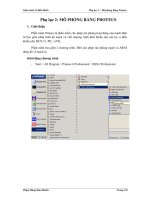Giáo trình New Head Way - Like and Dislikes pptx
Bạn đang xem bản rút gọn của tài liệu. Xem và tải ngay bản đầy đủ của tài liệu tại đây (3.21 MB, 65 trang )
Likes and dislikes
Like
Verb + -ing or infinitive?
Signs and soundbites
2
Aims
•
Help the students know and use Like as a verb, a
preposition and some grammar spots of the lesson.
•
Help the students know a number of basic verb
patterns in English.
•
Help the students understand relative pronouns and
participles in a description
Objectives
•
Students are able to understand and distinguish
between the different uses of Like
•
Students are able to practice verb patterns, relative
pronouns and participles in a description
•
Through the reading, listening, speaking. Students
are able to translate the texts into Vietnamese and
practise the sentence patterns.
Introduction to like
Like can be a verb or a preposition.
Like as a verb can be followed by - ing or to, sometimes with a change
in meaning.
I like going out at the weekend. (general enjoyment)
I like to sit in a hot bath and read. (habits and preferences)
Like as a verb has a person as the subject:
I like modern art.
I don't like the way he looks at me.
Do you like fish?
Would you like a drink?
Like as a preposition has an object after it:
She's wearing a hat like mine.
He's nothing like his father.
That sounds like the postman.
You're behaving like children.
This is new girlfriend of his - what's she like?
4
•
TEST YOUR GRAMMAR
1.In the following sentences, is like used as a verb or a preposition?
a. How do you like your coffee, black or white?
b. I’m just like my father. We’re both tall and thin with black hair and brown eyes.
c. Don’t you think that Pedro looks like Tom Cruise?
d. What would you like to do tonight?
e. ‘We went to that new restaurant last night’.
‘Really? What was it like?’
f. ‘How do you tie a tie?’
‘Let me show you. Like this’.
g. ‘Shall we go home now?’
‘If you like’.
5
what like?
What is/are/was/were like? is used to ask about the permanent
nature of people and things. It asks for a description or an impression
or a comparison.
What's the health service like in your country?
What are the new students like?
(!) Be careful!
1 With a description or an impression, we do not use like in the
answer.
What's London like? It's quite big, and it's very interesting.
NOT It's like quite
What is Amanda like? She's tall, attractive, and very funny.
NOT She's like tall
2 With a comparison, we can use like in the answer. Here, like means
similar to / the same as.
What’s London like? It's like New York, but without the tall
buildings. (= It's similar to )
What’s Amanda's daughter like?
She's just like Amanda.
(= She's the same as )
How ?
1. How ? is used to ask about the present condition of something
that can change.
2. To ask about the weather, we can use both questions.
3. How ? is also used to ask about people's health and happiness.
Compare:
4.How ? is also used to ask about people's reactions and feelings.
How's work these days?
It's better than last year.
How was the traffic this
morning?
It was worse than usual.
How's Peter?
What's Peter like?
He's fine.
He's a nice guy. He's quite tall, has dark hair
How's the weather?
What's the weather like?
How's your meal?
How's your new job?
How ? or What like?
Sometimes we can use What like? or
How ? , but they aren't the same.
What like? asks for an objective
description. How ? asks for personal
feelings.
Compare:
How's the party?
What's the party like?
It's great !
It's very noisy, but there's
lots to eat and drink.
8
2. Match a sentence with a picture
1. They stopped to talk to each other
2. They stopped talking to each other
What’s the difference in meaning between
sentences 1 and 2?
9
Questions with like
1 In Britain, some school children go on exchanges to another country.
They stay with a family for two weeks, and then the boy or girl of the
family comes back to Britain for two weeks. Does this happen in your
country?
2 Read the conversation between Anna and Nina, two schoolgirls. Put one
of the questions from the box into each gap.
Anna: My French exchange visitor
came yesterday.
Nina: What’s her name?
Anna: Marie-Ange.
Nina: What a pretty name!(1)
……………
Anna: She’s really nice. I’m sure we’ll
get on really well. We seem to
have a lot in common.
Nina: Why do you say that?(2)
……………
Anna: Well, she likes dancing, and so
do I. And we both like tennis and
listening to music.
Nina: That sounds great. I saw you
with someone this morning. Was
is Marie-Ange?
(3)………………
Anna: She’s quite tall, and she’s got
long, dark hair.
Nina: No, it wasn’t her, then. Now,
we’re all going out tomorrow,
aren’t we? Shall we go for a pizza,
or shall we go to the cinema?
(4)………………
Anna: I’ll ask her tonight and tell you
tomorrow. By the way, someone
told me your mum’s not very well.
What’s the matter?(5)……………
Nina: Oh, she’s OK. She’s had a bad
sore throat, that’s all, but it’s
getting better now.
Anna:Oh, it’s not too bad, then.
What would she like to do?
What does she look
like?
How is she?What does she like doing?
What’s she like?
2 Read the conversation between Anna and Nina, two schoolgirls. Put
one of the questions from the box into each gap.
11
Grammar question
1 Match the questions from the box in Exercise 2 with the
definitions below.
Question Definition
a.________________ = Tell me about her physical appearance.
b.__________________ = Tell me about her interests and hobbies.
c.__________________ = Tell me about her because I don’t know
anything about her.
d.__________________ = Tell me about her health.
e.__________________ = Tell me about her preference for tomorrow
evening.
2 In which questions it like used as a verb, and in which is it a
preposition?
What's she like?
What does she look like?
What would she like to do?
How is she?
What does she like doing?
12
Question and answers
Match a question in A with an answer in B.
A
a. What does he like?
b. What’s he like?
c. What does she look
like?
d. How is he?
B
He isn’t very well, actually.
He’s got the flu.
He’s really nice. Very
friendly and open, and
good fun to be with.
He likes swimming and
skiing, and he’s a keen
football fan.
He’s quite tall, average
build, with straight brown
hair.
13
LISTENING
Listen to nine short descriptions of people or things.
Write an appropriate question for each.
14
Listening
Descripsion
Gosh! Haven’t you ever tried
Indian food? It’s absolutely
delicious. Really rich! It can be
hot, but it doesn’t have to be.
Question
What’s Indian food like?
15
Descriptions
In pairs, ask and answer the following questions.
a. What sort of things do you like doing?
b. How are your parents?
c. Who do you look like in your family?
d. Who are you like in terms of character?
e. What are you like as a person?
f. What’s your school like?
g. What does your teacher look like?
16
Descriptions
In pairs, ask and answer the following questions.
a. What sort of things do you like doing?
b. How are your parents?
c. Who do you look like in your family?
d. Who are you like in terms of
character?
a. What are you like as a person?
b. What’s your school like?
c. What does your teacher look like?
√
√
√
√
17
Verb
patterns
Verb + - ing
Verbs+ to +
infinitive
Verbs+
preposition+ -ing
Verbs+ sb+ to+
infinitive
Verbs+ sb+ infinitive
(no to)
Verbs+ -ing or to +
infinitive (with no
change in meaning)
Verbs + - ing or to
+ infinitive (with a
change of meaning)
18
Verbs + - ing
adore
can't stand
don 't mind
Enjoy
finish
look forward to
doing
Swimming
cooking
Note
We often use
the verb go +
-ing for sports
and activities.
I go swimming
every day.
I go shopping on
weekends.
Verbs + to + infinitive
Agree Forget
help hope
Learn
Manage
Choose Dare
decide expect
Need Offer
Promise refuse
Seem want
would hate would like
would love would prefer
To do
To come
To cook
Notes
1 Help and dare can be
used without to.
We helped clean up the
kitchen.
They didn't dare disagree
with him.
2 Have to for obligation.
I have to wear a
uniform
3 Used to for past habits.
I used to smoke,but I
quit last year.
19
Verbs + sb + infinitive (no
to)
help
let
make
Her
us
do
Notes
To is used with
make in the
passive.
We were made
to work hard.
Let cannot be
used in
the
passive.
Allowed
to is
used
instead.
She was
allowed
to leave.
Verbs + sb + to + infinitive
advise
Allow
ask
Beg
Encourage
Expect
Help
Invite
Need
order
remind
tell
Want
Warn
Would like
me
him
the
m
som
eone
to do
to go
to
come
NOTE
Help can be used
without to.
I helped him do
the dishes.
20
Verbs + - ing or to + infinitive
(with little or no change in
meaning)
begin
continue
Hate
like
Love
Prefer
start
Doing
to do
Verbs + - ing or to + infinitive (with
a change in meaning) remember
remember
stop
try
Doing
To do
Notes
1. I remember
posting the
letter.
(= I have a memory
now of a past
action:
posting the
letter.)
2. I remembered to
post the letter.
(= I reminded
myself to post
the letter.I
didn't forget.)
3. stopped drinking
coffee.
(= I gave up the
habit.)
4. I stopped to drink
a coffee.
(= I stopped doing
something else in
order to have a cup
of coffee.)
5. tried to sleep.
(= I wanted to sleep,
but it was
difficult.)
6. I tried counting
sheep and drinking
a glass of warns
milk.
(= These were
possible ways of
getting to sleep.)
Verbs+ pre+ - ing
Be bored with
Be interested in
Be fed up with
Doing
Learning
We’re thinking of
morning the house
I’m looking
forward to having
more free time
21
D
e
a
r
D
e
n
n
i
s
W
e
j
u
s
t
w
a
n
t
e
d
(
a
)
s
a
y
/
t
o
s
a
y
/
s
a
y
i
n
g
t
h
a
n
k
y
o
u
f
o
r
p
u
t
t
i
n
g
u
s
u
p
b
e
f
o
r
e
w
e
c
a
u
g
h
t
t
h
e
p
l
a
n
e
l
a
s
t
w
e
e
k
.
I
t
w
a
s
a
l
o
n
e
l
y
e
v
e
n
i
n
g
,
a
n
d
w
e
e
n
j
o
y
e
d
(
b
)
m
e
e
e
t
i
n
g
/
t
o
m
e
e
t
/
m
e
e
t
y
o
u
r
f
r
i
e
n
d
s
,
P
e
t
e
a
n
d
S
a
r
a
h
.
W
e
m
a
r
a
g
e
d
(
c
)
g
e
t
/
g
e
t
t
i
n
g
/
t
o
g
e
t
t
o
t
h
e
a
i
r
p
o
r
t
w
i
t
h
p
l
e
n
t
y
o
f
t
i
m
e
t
o
s
p
a
r
e
.
W
e
e
v
e
n
t
r
i
e
d
(
d
)
g
e
t
t
i
n
g
/
t
o
g
e
t
/
g
e
t
a
n
e
a
r
l
i
e
r
f
l
i
g
h
t
,
b
u
t
i
t
w
a
s
n
’
t
p
o
s
s
i
b
l
e
.
W
e
h
a
d
a
w
o
n
d
e
r
f
u
l
h
o
l
i
d
a
y
i
n
S
p
a
i
n
.
W
e
j
u
s
t
l
o
v
e
d
(
e
)
d
r
i
v
i
n
g
/
t
o
d
r
i
v
e
/
d
r
i
v
e
t
h
r
o
u
g
h
t
h
e
c
o
u
n
t
r
y
s
i
d
e
,
a
n
d
w
e
o
f
t
e
n
s
t
o
p
p
e
d
(
f
)
w
a
l
k
/
w
a
l
k
i
n
g
/
t
o
w
a
l
k
r
o
u
n
d
a
m
o
u
n
t
a
i
n
v
i
l
l
a
g
e
.
W
e
m
e
t
o
u
r
f
r
i
e
n
d
s
,
B
i
l
l
a
n
d
S
u
e
,
a
n
d
t
h
e
y
i
n
v
i
t
e
d
u
s
(
g
)
h
a
v
i
n
g
/
t
o
h
a
v
e
/
h
a
v
e
a
m
e
a
l
w
i
t
h
t
h
e
m
.
T
h
e
y
w
a
n
t
e
d
(
h
)
t
h
a
t
w
e
s
t
a
y
/
u
s
t
o
s
t
a
y
/
w
e
t
o
s
t
a
y
w
i
t
h
t
h
e
m
,
b
u
t
w
e
c
o
u
l
d
n
’
t
,
a
s
w
e
h
a
d
a
l
r
e
a
d
y
b
o
o
k
e
d
a
h
o
t
e
l
.
T
h
e
w
e
a
t
h
e
r
w
a
s
f
a
n
t
a
s
t
i
c
.
T
h
e
s
u
n
d
i
d
n
’
t
s
t
o
p
(
i
)
s
h
i
n
i
n
g
/
t
o
s
h
i
n
e
/
s
h
i
n
e
a
l
l
t
h
e
t
i
m
e
w
e
w
e
r
e
t
h
e
r
e
.
L
e
a
v
i
n
g
S
p
a
i
n
w
a
s
v
e
r
y
s
a
d
.
I
t
m
a
d
e
m
e
(
j
)
w
a
n
t
/
w
a
n
t
i
n
g
/
t
o
w
a
n
t
t
o
c
r
y
.
A
n
y
w
a
y
,
w
e
’
r
e
l
o
o
k
i
n
g
f
o
r
w
a
r
d
t
o
h
e
a
r
i
n
g
f
r
o
m
y
o
u
,
a
n
d
h
o
p
e
(
k
)
s
e
e
/
t
o
s
e
e
/
s
e
e
i
n
g
y
o
u
s
o
o
n
.
L
e
t
u
s
(
l
)
t
o
k
n
o
w
/
k
n
o
w
i
n
g
/
k
n
o
w
i
f
y
o
u
’
r
e
e
v
f
e
i
n
t
h
e
a
r
e
a
.
Y
o
u
m
u
s
t
c
a
l
l
i
n
.
B
e
s
t
w
i
s
h
e
s
,
S
a
n
d
r
a
22
PRACTICE
PRACTICE
Grammar and listening
When one verb is followed by another, different patterns are possible.
Put the verbs from the Presentation text in the correct box.
Verb + -ing Verb + infinitive (with to)
Verb + person +
infinitive with to
Verb + person +
Infinitive without to
23
Discussing grammar
Work in pair and discuss your answer.
In the following sentences, two verbs are possible and one is not. Underline the
verb that is not possible.
a. My father to mend my bike.
1 promised 2 didn’t mind 3 tried
b. She her son to turn down his music.
1 asked 2 wanted 3 made
c. I going on long walks.
1 refuse 2 can’t stand 3 adore
d. We to go shopping.
1 need 2 love 3 enjoy
e. She me do the cooking.
1 wanted 2 made 3 helped
f. I working for the bank twenty years ago.
1 started 2 stopped 3 decided
24
a. My father……………to mend my bike.
b. She……her son to turn down his music.
c. I…………………… going on long walks.
d. We……………….to go shopping.
e. She……….me do the cooking.
f. I……… working for the bank twenty
years ago.
Change the sentences in Exercise 1 using the verb you underlined.
a. My father didn’t mind mending my bike.
1 promised 2 didn’t mind 3 tried
1 asked 2 wanted 3 made
1 refuse 2 can’t stand
3 enjoy
3 adore
1 need
2 made
2 love
1 wanted 3 helped
3 decided2 stopped1 started
25
LANGUAGE REVIEW
Asking for descriptions
1.What’s London like? means ‘Tell me about London because I don’t know
anything about it’. It is a very general question.
When it is asked about a person, the answer can refer to character or
appearance or both.
What’s Peter like?
He’s quite tall, with short blond hair.
He’s really nice. You’d like him.
2. What does she look like? asks for a physical descriptions.
What does she look like?
She’s very pretty. She’s got long black hair, and dark, mysterious eyes.
3. How are your parents? asks about their health and general happiness. It does not
ask for a description.
How are your parents?
They’re fine, thanks. My mother had a cold, but she’s better now.









